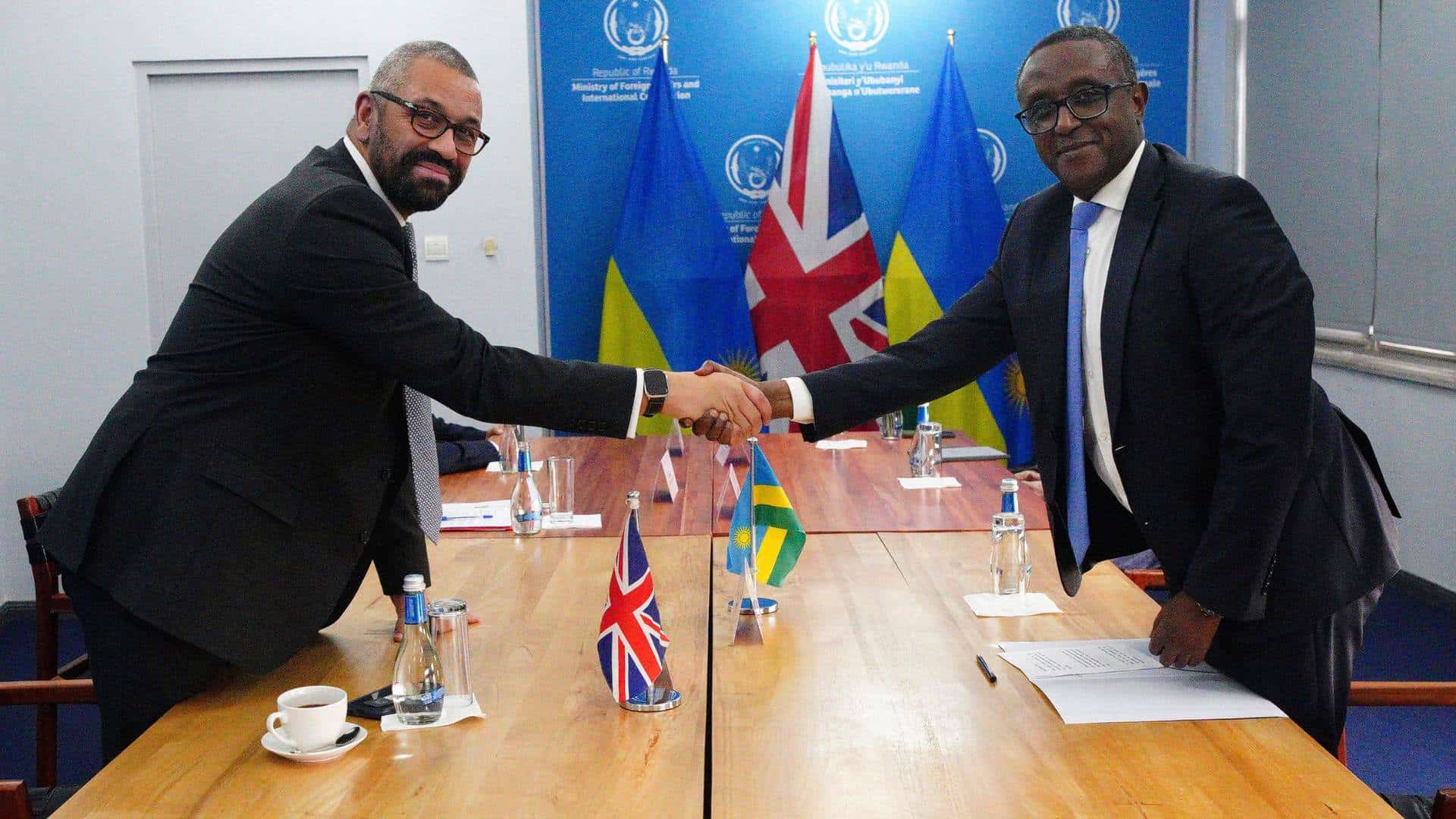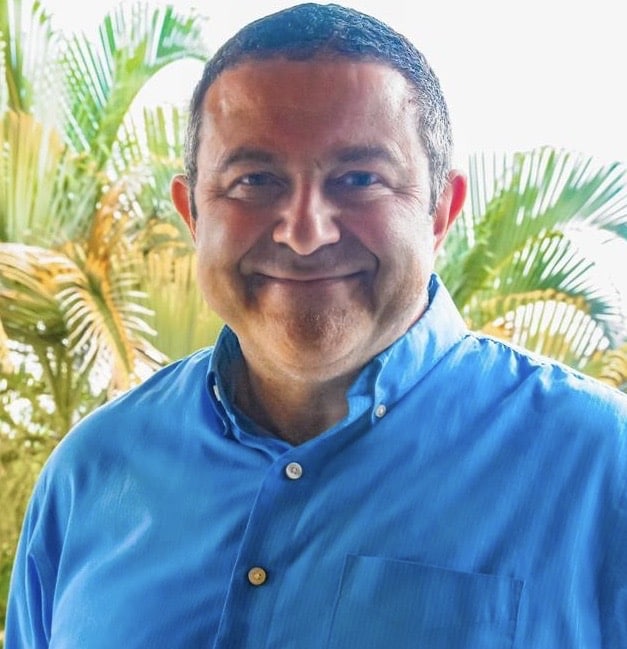Britain wants to send migrants to Rwanda. The British court says that’s not safe. For our correspondent Rwanda is home — and a place people come to for safety.

Home Secretary James Cleverly and Rwandan Minister of Foreign Affairs Vincent Biruta shake hands at a bilateral meeting after they signed a new treaty in Kigali, Rwanda, 5 December 2023 to allow for the deportation of asylum seekers from the UK to Rwanda. (Ben Birchall/PA Wire via AP)
This article was produced exclusively for News Decoder’s global news service. It is through articles like this that News Decoder strives to provide context to complex global events and issues and teach global awareness through the lens of journalism. Learn how you can incorporate our resources and services into your classroom or educational program.
When the UK Supreme Court ruled “unlawful” on 15 November 2023 the Conservative government’s plan to deter unauthorised migration by sending asylum seekers to the East Africa country of Rwanda, it struck me to the core.
Not because I support what many people see as the ruling party’s immoral abdication of responsibility to those seeking shelter from oppression and violence or the Rwanda government’s desire to earn hundreds of millions of pounds and curry favour as a solid international partner.
I was upset because the judges claimed that Rwanda is not a “safe” third country to host those who flee their home countries for whatever reason. On 17 January 2023, the UK House of Commons narrowly voted to declare Rwanda “safe” for UK asylum seekers but many observers see this as a purely political ruse, which has little chance of success.
Either way, safety is a fundamental human need and it has been an important factor in my life for me and my family, who live in Rwanda.
I understand what it means to feel unsafe. My Jewish grandparents fled persecution in Eastern Europe to come live in the welcoming sanctuary that England provided at the turn of the 19th century. But that gratitude and comfort turned into fear and nightmares for me as an Orthodox teen growing up in my first family in the increasingly anti-semitic and hostile environment of Northwest England in the 1970s.
Taking refuge in Rwanda
I sought refuge in the United States where few people realised or seemed to care that I was Jewish despite my surname and appearance. As my second family, this largely felt safe. But this sense of wellbeing was profoundly shaken in Charlottesville, Virginia in August 2017 when white supremacists reprised a Nazi chant “Jews will not replace us” at a “Unite the Right” rally.
Even before the murder of George Floyd by police and the 6 January 2021 assault on the U.S. Capitol, I escaped to the relative calm and social cohesion of Rwanda, which has successfully recovered from the horrific genocide of 1994 and is now one of the fastest growing economies in Africa. More significantly, it is one of the safest.
In 2023, the BBC found that Rwanda was the second most safe (and gender inclusive) country in the world — after Slovenia and ahead of United Arab Emirates, Japan and Norway — for solo female travelers.
Home crime, domestic violence and personal assaults do certainly all happen in Rwanda, as in every country in the world. There is limited media freedom and political expression. And there is always a latent threat from certain armed rebel groups just over the border in the east of the Democratic Republic of the Congo (DRC), particularly in the run-up to Rwanda’s next presidential election in July 2024.
“This all makes me anxious but I still feel generally safe here,” one first-time voter told me, asking that their name not be published.
DRC President Felix Tshisekedi even compared Rwanda President Paul Kagame to Hitler and threatened to declare war on its neighbour on the campaign trail before the recent Congolese election, which he won amid accusations of fraud.
“I don’t think he would be stupid enough to attack Rwanda,” said an Eastern Congolese voter, who also requested not to be identified. “I feel much safer in Rwanda than here.”
Valuing safety above all else
My situation is clearly different from the estimated 135,000 migrants, refugees and asylum seekers, who have come to Rwanda mostly from the DRC, Burundi and more recently Libya. Many of them live in refugee camps that are dotted across the country. Over 60,000 live in the Mahama camp in the Eastern Province alone. On the one hand, many of them feel protected from political persecution and general crime here.
“At least here we can sleep,” one Congolese refugee told Sky News recently. And the Rwandan government was quick to guarantee the safety of Burundians stranded here after the government in Bujumbura, the largest city in Burundi, unilaterally closed the border on 11 January.
On the other hand, many do not want to live their whole lives or raise children in these camps, particularly young people who have only known this kind of life.
But what are the realistic alternatives?
Where peace can be found
Rwanda is a small, densely populated country, with limited natural resources and high youth unemployment. Despite widespread feelings of peace and safety amongst Rwanda’s citizens, the independent Institute for Economics & Peace’s Global Peace Index (GPI) 2023 recently ranked Rwanda only 88th out of 163 countries around the world.
This mid-table ranking is largely due to perceptions of ongoing economic and political instability. Some observers believe negative perceptions are also fueled by lingering but erroneous Global North stereotypes of Rwandans running around with machetes, with an evil, corrupt dictator in charge. One foreign resident in Kigali said that this may be part of a blanket “Africa is unsafe” slur.
Unfortunately, things are worse for Rwanda’s neighbours. According to the GPI, Burundi is only the 128th most peaceful country in the world and the Democratic Republic of the Congo is 159th.
So if refugees and asylum seekers feel unsettled and unfulfilled in Rwanda and unsafe in their original home nearby, where else?
The obvious answers would seem to be Europe or North America. Even one of the relatives of my Rwandan wife longs for a more productive, bountiful life in the United States or Canada for her and her young son. Perhaps that is an updated version of the American Dream?
The reality may be somewhat different.
The American Dream vs. an African Dream
The Global Peace Index judged Iceland, Denmark and Ireland to be the three most peaceful countries in the world. Canada came in at 11th. But the UK — somewhat ironically given its judgments on Rwanda — was only 37th and the United States was ranked a shockingly low 131st even below troubled Haiti!
Of these “desirable” destinations, Canada has been one of the most welcoming. According to the UN Office of Migration, it has safely assisted the resettlement of more than 30,000 refugees from Rwanda since 2010.
And yet, its patience seems to be wearing thinner these days. Canada has repeatedly denied a visa to another relative of my wife’s despite a confirmed university place and local sponsorship in Toronto.
Could the ultimate answer be closer to home?
According to World Data, neighboring Uganda was the most popular destination for Rwanda asylum applications in 2022. Unfortunately, Uganda is only 124th on the Global Peace Index and two thirds of the applications were rejected, in any case.
Number two on the list is Malawi, which accepted 100% of applications and is 74th on the Global Peace Index. But anecdotal reports suggest that it is much less secure in terms of personal safety and health.
So what is the conclusion from all of this?
There may not be any ideal place to live in the world, particularly for a refugee or asylum seeker. But there is a lot to be said for a place where there are feelings of both external peace and safety as well as internal community and belonging, whether it is the Congolese in Canada, the Burundians in Malawi or even long-term refugees in the Mahama camp in Rwanda.
Or in the words of two famous African proverbs:
“Peace is costly, but it is worth the expense.”
“Home is not where we live; Home is where we belong.”
Three questions to consider:
- Why do people leave their homes and often risk their lives to seek refuge and asylum in other countries?
- What are the three most important factors for you in terms of choosing another country to live in?
- What do the closing quotations about peace and home mean to you?

Jeremy Solomons is a global leadership coach and facilitator based in Kigali, Rwanda, where he has written regular “Leading Rwanda” and "Letter from Kigali" columns for the New Times newspaper. In the past, he was a Reuters financial reporter in Hong Kong and New York City and then a foreign correspondent in Frankfurt. He was also a farmer in Israel; factory worker and teacher in France; banker in England and Switzerland; and entrepreneur in Italy.
Read more News Decoder stories about Rwanda:
